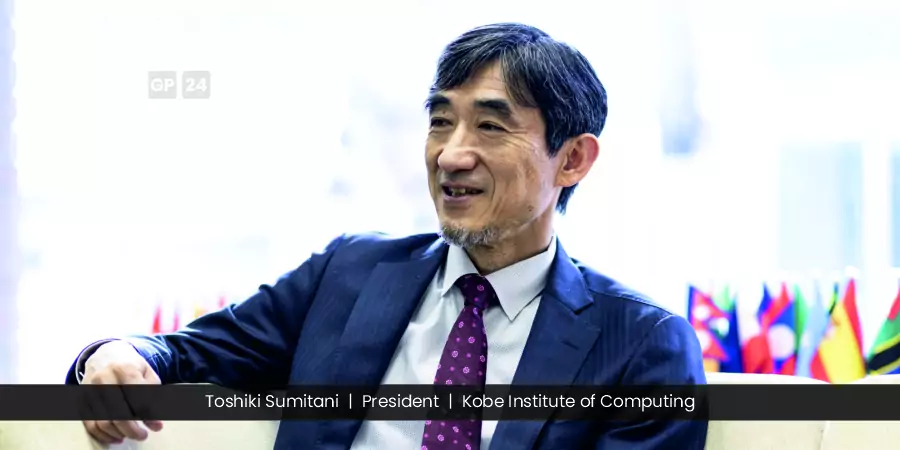In the post-COVID world, education has evolved from the mere definition of imparting knowledge. It is now about reshaping perspectives, kindling curiosity, and building resilient communities that thrive in the face of an ever-changing world.
For Toshiki Sumitani, the President of Kobe Institute of Computing (KIC), this vision of education has been the driving force behind his remarkable journey as a transformative leader. With a career that spans decades, Toshiki’s path to becoming a leader in education began with a desire to challenge the conventions of Japan’s standardized education system.
Inspired by an alternative approach that values individuality over conformity, Toshiki has consistently sought to redefine the purpose of education: to make it personalized, borderless, and deeply relevant to real-world challenges.
“My vision for education isn’t just about teaching technical skills. It’s about empowering students to become problem-solvers, to understand their potential, and to use their knowledge to make a difference in the world,” Toshiki asserts. His philosophy has not only shaped the students he teaches but also the broader education system, making KIC a beacon of innovation and social impact.
From establishing Japan’s first inquiry-based school to leading KIC’s initiatives, Toshiki’s mission has always been to create an environment where creativity thrives, and education is upheld as a tool for change. Under his leadership, KIC has evolved into a global hub for students eager to tackle pressing societal issues, using the latest technologies as a catalyst for meaningful impact.
As we delve deeper into Toshiki’s vision and initiatives, we understand how his approach to education is not merely about learning, but about transformation, both at an individual level and across society.
A Journey Cemented in Innovation and Purpose
Toshiki’s journey to becoming the President of KIC began with a deep awareness of the challenges that Japan’s standardized education system was facing. He saw firsthand how traditional approaches often failed to align with the needs of a rapidly evolving world. His perspective changed profoundly during his time living in Denmark, where he was inspired by an educational system that emphasized individualized learning and empowered students to harness their unique strengths and passions.
Motivated by this experience, Toshiki established Japan’s first inquiry-based alternative school, LearnNet Global School, in 1996. This innovative model attracted attention, ultimately leading KIC’s leadership to invite him to bring this educational philosophy to their graduate school, particularly for students learning ICT. His approach at KIC has always focused on empowering students to actively explore how their skills can address real-world social issues, rather than just acquiring technical knowledge.
Over the past 15 years, Toshiki has shared his methodology with students from over 100 countries, many of whom have gone on to become leaders driving social change in their home nations. His commitment to nurturing socially aware and technically skilled graduates has set KIC apart as a leader in progressive education.
Envisioning the Future of Education
Toshiki’s vision for the future of education revolves around the principles of personalized optimization, borderless learning, and practical problem-solving. He believes that with the rapid development of AI, it is increasingly possible to tailor education to everyone’s unique interests and aptitudes. Learning, in Toshiki’s view, should move beyond the confines of traditional schools and engage directly with society and nature to offer experiential, hands-on learning.
“Education must transform into a journey of purposeful exploration and impact-driven practice,” he asserts. This model encourages students to take an active role in solving real-world challenges, positioning education as an engine for meaningful change rather than just a means to an end.
Setting Benchmarks of Leadership
Under Toshiki’s leadership, the core mission of KIC has been to cultivate a new generation of leaders capable of leveraging cutting-edge technologies, such as AI, to address and solve pressing social issues.
To Toshiki, a visionary leader in education is someone who transcends conventional practices and envisions the competencies that will be critical in an evolving global landscape. He believes that such a leader identifies the most effective methods for acquiring these skills and possesses the ability to gather essential resources—people, technology, and funding—to bring their vision to fruition.
“A visionary leader is not just about making decisions; it’s about fostering an environment where innovation and collaboration thrive,” Toshiki explains. By encouraging students and faculty to think beyond established boundaries, he aims to create a transformative educational experience that equips learners to thrive in the future.
Championing Diversity and Inclusion
Diversity and inclusion are fundamental pillars at KIC, and Toshiki is deeply committed to fostering a multicultural environment where creativity can flourish. KIC’s community brings together students and faculty from a wide range of cultural backgrounds, including Africa, the Middle East, and Asia, as well as individuals with deep expertise in IT and various applied fields.
“By embracing diverse perspectives and experiences, we drive creativity and impactful problem-solving in meaningful ways,” Toshiki emphasizes. He believes that a collaborative, multicultural environment is key to creating innovative solutions that would be impossible to achieve within a homogenous setting.
Words of Wisdom for Emerging Leaders
When asked what advice he would give to emerging leaders in education, Toshiki encourages them to step beyond the confines of traditional educational frameworks and immerse themselves directly in society and nature. He believes that true innovation and growth often lie at the intersection of diverse perspectives and lived experiences.
“Seek out diverse experiences that expand your understanding of both artificial, virtual worlds and the tangible, real-world dynamics of nature and living beings,” Toshiki advises. He urges future leaders to strive for an optimal blend of these contrasting realms, as this is where the most profound innovations can emerge.
The Fulfilment of a Leader’s Purpose
During Toshiki’s tenure at KIC, there have been several key milestones and achievements that reflect his dedication to educational innovation. Notably, he developed a curriculum focused on applying IT technology to address social issues through a novel methodology known as the “Tankyu Method.” This innovative approach has been expanded globally, reaching students in over 100 countries.
KIC’s pioneering educational models have earned multiple national and international awards, including the prestigious JICA President’s Award. The institute has also been recognized as the most sustainable university in Japan and lauded as the most agile educational leader in the Asia-Pacific region, reflecting KIC’s commitment to impactful, forward-thinking education.
Looking ahead, Toshiki predicts that one of the most significant trends impacting computing education will be the rapid acceleration of learning and creation enabled by generative AI. He believes that this technology will allow for the instantaneous sharing of human knowledge and wisdom, transforming the pace at which people learn, collaborate, and innovate.
“The boundaries of what is possible in computing education will continuously be pushed,” Toshiki notes. He envisions a future where the possibilities for growth and creativity are limitless, driven by the power of generative AI.
















